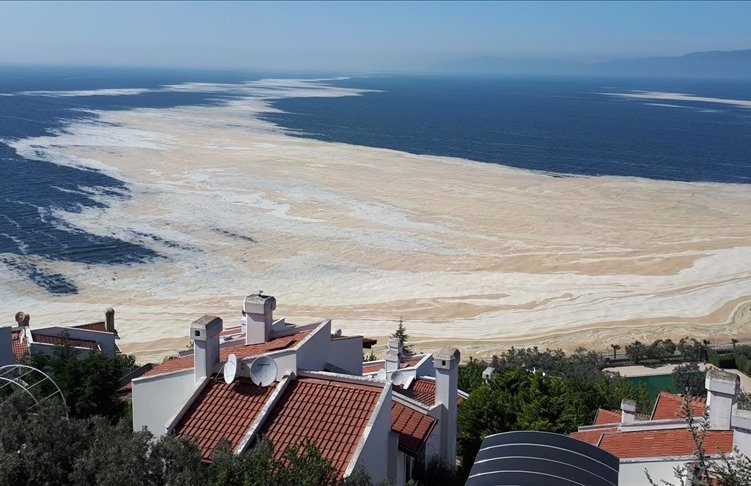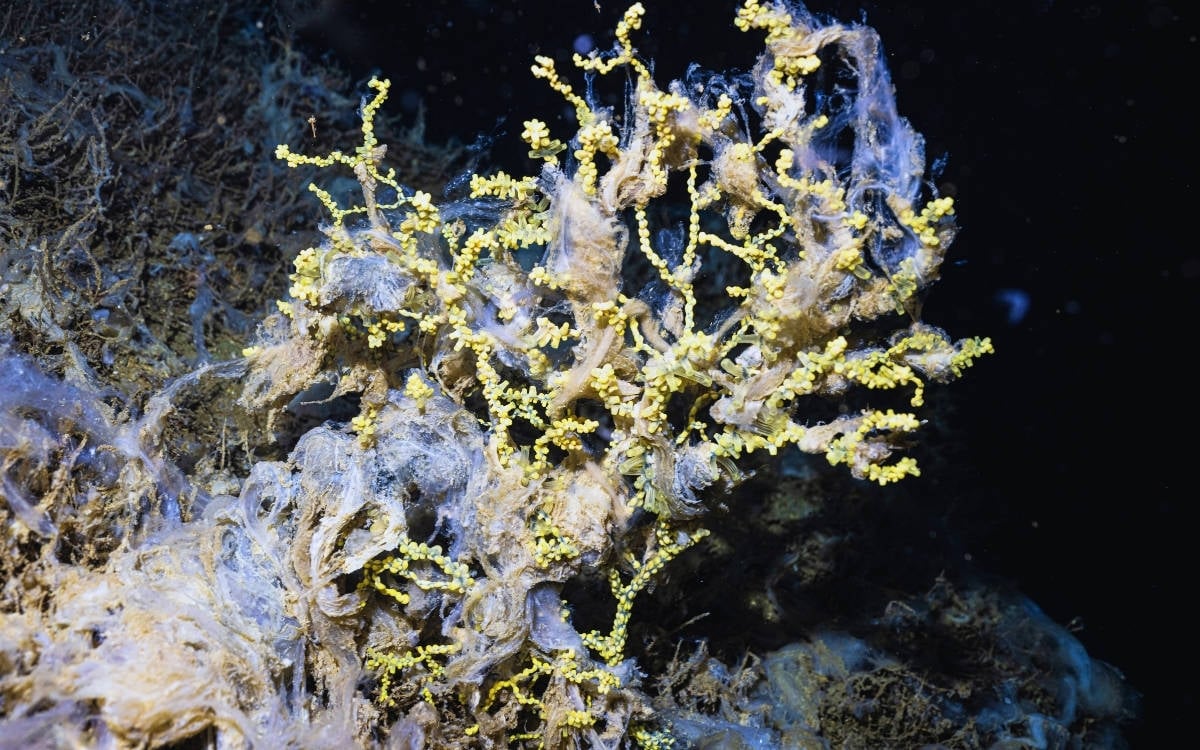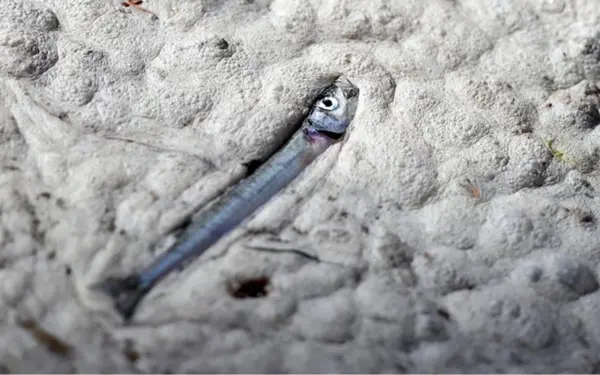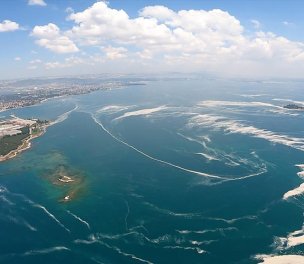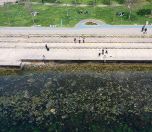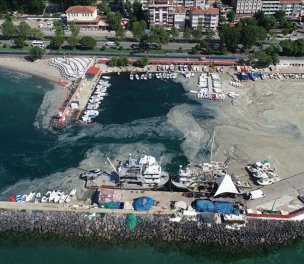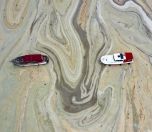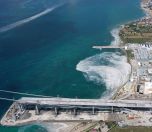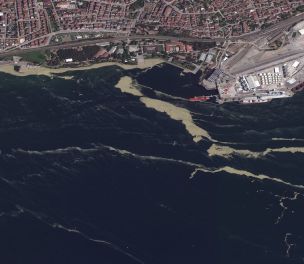Photo: AA/File
Click to read the article in Turkish
Established to determine the causes of the marine mucilage problem in the Sea of Marmara, an inland sea in northwestern Turkey, and other seas, the Parliamentary Inquiry Committee on Mucilage has completed its report.
MP Mustafa Demir of the ruling Justice and Development Party (AKP), who chairs the committee, said no untreated wastewater should be discharged into the sea from the seven provinces around it.
"7.5 million cubic meters of wastewater is discharged to the Sea of Marmara. Seventy-six percent of this is from Istanbul. At all costs, İstanbul should no longer discharge water into the Sea of Marmara without advanced biological treatment," he said.
A thick layer of marine mucilage, also known as "sea snot," had covered the surface of the sea for months last year. The government launched efforts to "vacuum up" the mucilage, but the underlying problems remained, according to experts.
CLICK - Pictures reveal mucilage density in the Sea of Marmara
CLICK - Bottom of Sea of Marmara also covered with sea snot, underwater photos show
CLICK - Marine mucilage expected to come back to Marmara, warns professor
How the problem should be solved
According to the committee report, the increased water needs due to the rapid population growth and excessive use of water due to the industrial and agricultural activities show the importance of wastewater management.
The report lists the following recommendations to solve the problem:
The basic principle in waste water management should be "minimum pollution" and "maximum recovery."
It should be ensured that the wastewater flow and pollution load are reduced by applying clean production practices based on the principle of preventing pollution at its source.
After the wastewater is treated with appropriate treatment methods, reuse alternatives should be evaluated and the discharge of wastewater should be carried out in accordance with the standards specified in the legislation.
The use of treated domestic wastewater in industry, parks, gardens and green field irrigation should become more common. Legal arrangements should be made about the reuse of used water.
The reuse of greywater should be encouraged by legal arrangements.
Advanced biological treatment should be applied to all domestic and industrial wastewater; reducing the nitrogen-phosphorus load of the Sea of Marmara should be prioritized.
All existing wastewater treatment facilities should be converted to advanced biological treatment facilities.
The practice of using the undercurrent of the Sea of Marmara as a conveyor to bring untreated or insufficiently treated wastewater should be abandoned.
Agricultural pollution
About the pollution in the Sea of Marmara caused by agricultural activities, the report says, "The most important factor in the formation of mucilage in the Sea of Marmara is the increase in the ratio of nutrients (nitrogen, phosphorus) in the water."
The overuse of chemical fertilizers, animal excrement that are not stored properly by livestock enterprises and the nutrients in silage waters cause pollution in the sea, according to the report.
"Strict measures should be taken to control the use of pesticides, fertilizers and other chemical compounds in the basin and to prevent the release of wastes during the use, production, transportation and storage of such chemicals; and the use of organic fertilizers in the basin should be encouraged."
What is mucilage, and why does it emerge?The mucilage, defined by fishermen as "nez", foam or snot, is the intense proliferation and color spiral of Gonyaulax fragilis, a type of phytoplankton from one-celled plant creatures. Although mucilage, which shows itself more in calmer seas, is natural, it can damage the ecosystem when it grows excessively. The Turkish Marine Research Foundation (TÜDAV) states that this yellow, white, colored mud-like substance has been seen and spread frequently above and below the water in the Black Sea, Marmara, and Aegean Seas in the last two years. The Marmara Environmental Monitoring Project (MAREM), which has been drawing attention to the mucilage problem in the Sea of Marmara since 2007, points out that such anomalies are an indicator of the level of pollution in the sea. Project manager Levent Artüz emphasizes that mucilage, which has a very sticky and contagious structure, can bring the end of life in the sea. Stating that the vast majority of fish eggs are found on the surface of the sea and the eggs on the surface lose their chance of survival by being trapped in the mucilage, Artüz says the same is true for the larvae. According to the information Artüz conveyed in 1+1 Forum, the mucilage collapses over time on creatures that cannot move such as mussels, oysters, and tunicates and covers the sea meadows and cuts off their contact with light. On the other hand, experts explain the causes of mucilage as the loss of oxygen in the sea due to filling the coasts and wastes and the rise in temperatures in the Mediterranean Basin due to global climate change. The Sea of MarmaraLooking at the sea surface temperature data, the temperature of the Sea of Marmara this year is 2.5 degrees above the average of 40 years, in other words, there is an anomaly of 2.5 degrees. Around 25 million people live around the Sea of Marmara. Nearly half of Turkey's industry is located around it as well. In other words, all domestic, industrial, and agricultural wastes go directly or indirectly to the Sea of Marmara. Scientists say that the most important thing to do against mucilage is not to dump untreated waste into Marmara. Another suggestion is to start work as soon as possible to develop a new waste management policy that also takes into account climate change. |
(TP/VK)




